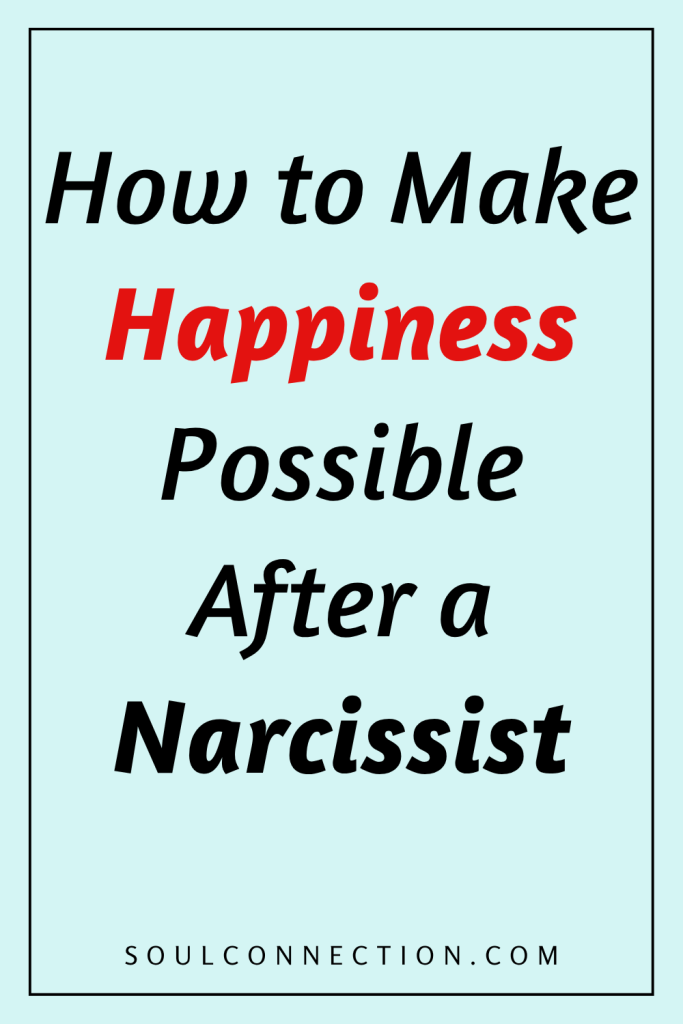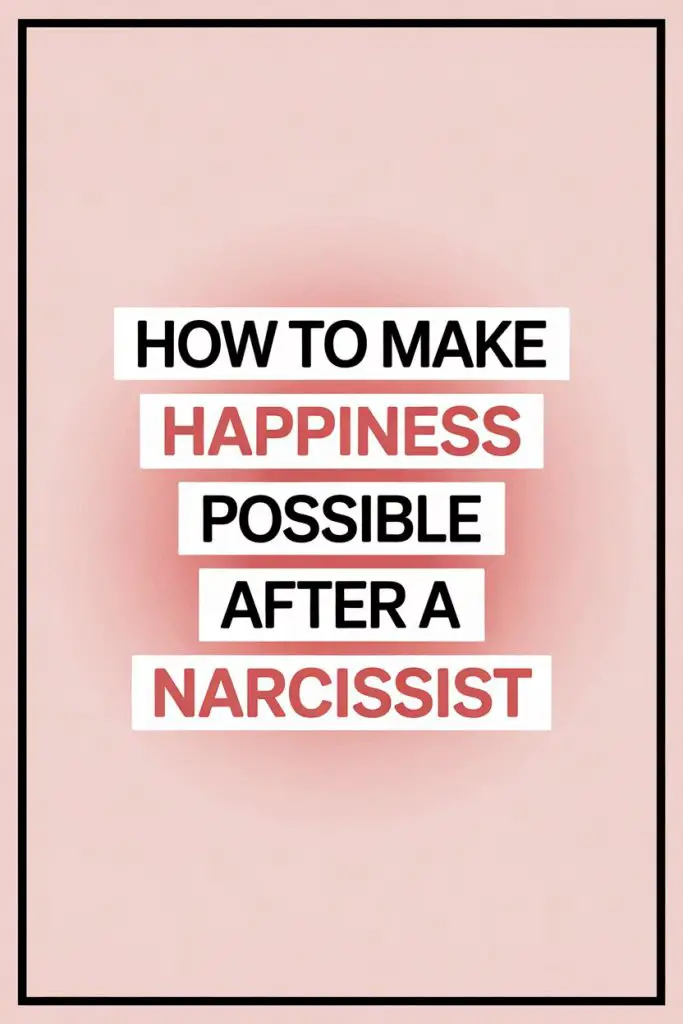Climbing out of a relationship with a narcissist can feel a lot like crawling out of a bear trap while someone critiques your crawling technique. Surviving is one thing; believing happiness could exist on the other side feels like a cosmic joke.
If you’re staring at the emotional debris wondering if joy is a myth cooked up by greeting card companies—welcome. Your skepticism is valid.
But that happiness you keep hearing about? Turns out, it’s possible.
And yes, even for you, the person who wasn’t allowed to sneeze without a performance review.
Let’s get into it.
Recognising Your Reality Isn’t Drama—It’s Recovery
Gaslighting. Stonewalling. The greatest hits of the narcissist’s relationship playlist. Part of recovering means finally trusting your own version of events.
Those years spent being told you’re “too sensitive” or “imagining things” can make you question your own reflection.
Relearning to believe yourself is step one. This doesn’t mean you need to recite your memoir at parties, but acknowledging—privately or to a therapist—that your pain and confusion were real is critical.
Emotional invalidation takes time to undo. Start with small truths: “That hurt me.” “I didn’t deserve that.” Sound basic? That’s the point.
Drawing Boundaries That Don’t Apologise
After a narcissist, the word “boundaries” might sound about as realistic as a unicorn in Tesco. But boundaries are simply the invisible fences that keep your peace inside and the nonsense outside.
It starts with tolerating the discomfort of saying “no” and not immediately offering an essay of apologies. Boundaries aren’t just for future partners; they’re for family, friends, colleagues, and anyone else who mistakes your kindness for a doormat.
Will some people react badly? Absolutely. That’s confirmation you’re on the right track. Congratulations—your boundaries work.
Unpacking the Suitcase of Self-Blame
Narcissists are specialists at packing guilt in every available crevice of your psyche. Forgotten to RSVP? Somehow your fault. Sun didn’t shine? Probably your fault. Spilling a drink in 2017? You’ll never hear the end of it.
Happiness after a narcissist often means unpacking all the self-blame they sneakily assigned to you. This involves examining your thoughts when things go wrong—do you immediately think it’s your fault? Challenge it.
Swap out “I messed up again” for “I’m allowed to make mistakes.” Remember, your worth doesn’t hinge on spotless performance.
Rediscovering Who You Are—Without Their Script
Ever try to order food after years of being told what you “really want”? The existential crisis at the salad bar is real. Narcissists are experts at scripting your likes, dislikes, and beliefs.
Finding happiness post-narcissist means getting reacquainted with your preferences. Try new things just because you want to—not because someone expects you to.
Notice what you gravitate toward, whether it’s music, hobbies, or the type of people you enjoy being around. No need to make it an identity crisis. Just let yourself be curious. Even if that means admitting you actually hate jazz.
Making Peace with the Grief of Lost Time
It’s easy to fixate on “wasted years.” Nothing like scrolling Instagram and realising the world kept spinning while you were trapped in a one-man soap opera. Grieving lost time is necessary, but it doesn’t have to define your present.
Allow yourself to feel it—weep, rage, binge on questionable TV—but resist the temptation to pitch a permanent tent in Regretville. Every day can be a fresh one, even if yesterday was a car crash.
The best revenge? Living a life you enjoy—one narcissist-free day at a time.
Finding Support That’s Actually Supportive
Toxic positivity has no place here. You don’t need someone telling you “everything happens for a reason” when your life’s been rearranged by a tornado of ego.
Genuine support is validating, patient, and never makes you feel like a burden.
Seek out friends, support groups, or therapists who listen more than they lecture. If your current circle can’t get on board with your healing, it might be time to widen your tribe.
There’s no medal for suffering in silence. Healing happens much faster when you have witnesses who actually want to see you win.
Recalibrating Your Red Flag Radar
Once upon a time, your radar for toxic behaviour might have been set to ‘airplane mode’. Now, it’s time for an upgrade.
Spotting narcissist traits early isn’t about becoming a suspicious hermit—it’s about protecting your mental health like it’s a limited edition.
Pay attention to how new people make you feel. Consistently confused? Suddenly apologising for things you didn’t do? That’s your cue, not a character flaw.
Spot the signals, and don’t be afraid to ghost anyone who gives off familiar bad vibes. Your time is precious—treat it like gold dust, not confetti.
Learning to Trust Again—Slowly, Like a Cat
Trust after a narcissist can look less like a leap and more like a suspicious animal sniffing the air. And that’s perfectly fine. The world is full of humans who aren’t out to rearrange your headspace, and you deserve to know what that feels like.
Building trust doesn’t require embracing blind optimism. It simply means acknowledging your own ability to spot nonsense, learning from the past, and giving people tiny chances to show up in gentle ways.
If someone proves trustworthy, let them in a little further. If not, there’s no shame in slamming the gate. You’re not paranoid; you’re wise.
Rewriting the Script on Self-Care
Bubble baths are lovely, but getting back to happy involves much more than treating yourself to lavender-scented water (unless you have shares in bath bombs). Self-care is about treating yourself like someone worth looking after.
Eat food that fuels you—not just food that fits someone else’s idea of “right.” Sleep enough, even if that means blocking your ex on every app. Exercise, if that feels good, or just go outside and scowl at a tree.
Self-care means putting your needs near the top of your list for once. Revolutionary concept, right?
Laughing Again—Yes, Even at Silly Things
Humor is healing, and it’s not just a cliché. After a narcissist, rediscovering your ability to laugh (especially at yourself) is a sign you’re not just surviving, but living.
Start small: watch daft videos, hang out with people who make you snort, or finally admit that dad jokes are as good as therapy sometimes.
Happiness isn’t about being upbeat every moment. It’s about those little flashes when you catch yourself smiling and realise, “Oh, I’m still me.” That’s the gold.
Dating Again Without Picking Up Strays
The temptation to prove you’re “over it” by jumping into dating is strong. But happiness post-narcissist means you get to take your time.
There’s no need to rescue every emotionally unavailable person you meet, or to settle for someone who triggers flashbacks of your ex’s greatest hits.
If and when you’re ready, approach dating with the attitude of a bored food critic: “Impress me.” You are the prize. Anyone who makes you doubt that can see themselves out.
Celebrating Your Low-Drama Life
Peace and quiet might feel suspicious at first—like waiting for a plot twist that never comes. That’s your trauma brain waiting for the next shoe to drop. With time, low-drama days start to feel delicious.
Enjoy boring. Relish routines. Embrace the fact that no one’s monitoring your every move.
Happiness isn’t always loud or wild; sometimes, it’s the bliss of a Sunday spent with tea, slippers, and zero drama. If that’s not worth celebrating, what is?
The Best Revenge Is a Life You Actually Want
Surviving a narcissist is a badge of honour you didn’t ask for, but happiness afterward is completely within reach.
Every time you choose your own peace, delight in your quirks, or let yourself hope again, you’re proving that joy can exist even after the worst of storms.
Your best life isn’t about erasing the past. It’s about refusing to let it define your future.
The narcissist? Old news. Your happiness? That’s the next big headline.


